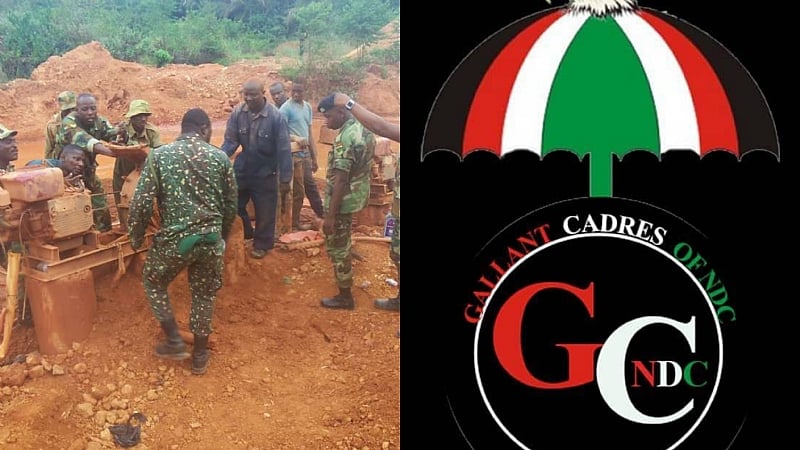The National Democratic Congress (NDC) Cadres have issued a fervent call to Ghanaians to unite behind President John Dramani Mahama’s decisive policy of permanently stationing military personnel in regions grappling with the pervasive issue of illegal mining, commonly known as “galamsey.” In their statement, the Cadres lauded the President’s anti-galamsey initiatives as unprecedented and commendable, highlighting the significant strides taken to combat this environmentally destructive practice. They emphasized the ongoing recruitment, training, and strategic deployment of 980 personnel to the Western and Savannah regions, regions particularly hard-hit by galamsey, as a testament to the government’s commitment. The Cadres also expressed their strong support for the planned expansion of the Blue Water Guard to a force of 2,000, deeming it a timely and necessary measure to protect Ghana’s precious water resources. They believe these interventions represent a critical step in safeguarding Ghana’s fragile ecological zones, including rivers, farmlands, and the broader natural environment, from the devastating consequences of illegal mining.
The NDC Cadres underscored the importance of a unified front against galamsey, urging civil society organizations, especially the Ghana Catholic Bishops Conference (GCBC) and the University Teachers Association of Ghana (UTAG), to actively support the government’s efforts. They cautioned against politicizing the issue, emphasizing that a collaborative, non-partisan approach is crucial for achieving meaningful and lasting success in eradicating illegal mining. The Cadres argue that tackling this complex problem requires a multifaceted strategy, and the government’s current actions represent a robust and comprehensive response. They believe that framing the issue as a purely political one undermines the collective effort needed to address the environmental degradation caused by galamsey. Instead, the Cadres advocate for collaborative engagement and support for the government’s initiatives.
Central to the government’s strategy, according to the Cadres, is the recognition of galamsey-affected areas as security zones warranting military presence. This approach aims to effectively address the destruction of water bodies, farmlands, and the overall natural environment. The Cadres highlight the government’s success in reclaiming nine forest reserves previously designated as “no-go” zones due to the presence of armed groups involved in illegal mining. They point to the recent deployment of military personnel in collaboration with the National Association of Small Scale Miners (NAIMOS) to retake control of the Jimira Forest Reserve and the Anwia Futu section of the Offin Shelterbelt, areas recently overrun by illegal miners. These actions, according to the Cadres, demonstrate the government’s commitment to actively combating galamsey and restoring control over affected areas.
Furthermore, the Cadres emphasized the importance of the Blue Water Guards initiative, a specialized force tasked with protecting Ghana’s waterways. They detailed the recruitment, training, and deployment of 980 personnel to the Western and Savannah regions, with plans to recruit an additional 1,020 personnel by the end of the year, bringing the total force to 2,000. This dedicated force is charged with conducting daily operations on major river bodies, acting as a community vanguard against illegal mining activities. The Cadres also highlighted the government’s future plans to focus on de-chemicalizing and restoring polluted water bodies, emphasizing the ongoing feasibility studies for this crucial restoration effort. These combined initiatives demonstrate the government’s multi-pronged approach to combating galamsey, addressing both the immediate security concerns and the long-term environmental damage.
Another critical element of the anti-galamsey strategy, as outlined by the Cadres, is the implementation of a robust equipment tracking system. Developed in collaboration with the Ministry of Transport, the Ministry of Finance (GRA-Customs Division), and the Ports and Harbours Authority, this system enables proactive tracking of imported excavators and other earth-moving equipment from their point of entry. The Cadres detailed the ongoing process of permitting and registering these machines, with 1,200 excavators currently under scrutiny. They reported that 1,015 pieces of earth-moving and mining equipment have been registered, and 647 have been fitted with tracking devices, while an additional 600 await clearance at the port. The Cadres also noted the expected arrival of 350 more tracking devices to further enhance monitoring efforts. This comprehensive tracking system, they argue, helps regulate the use of heavy machinery and prevent its deployment in illegal mining operations.
In conclusion, the NDC Cadres painted a picture of a government actively engaged in combating galamsey on multiple fronts. They pointed to the deployment of military personnel, the establishment and expansion of the Blue Water Guard, and the implementation of a sophisticated equipment tracking system as key elements of a comprehensive strategy. They urged all Ghanaians, including civil society organizations, to support these efforts, stressing the importance of a united and non-partisan approach to effectively address this critical national issue. The Cadres firmly believe that through these concerted actions, the government is demonstrating its commitment to protecting Ghana’s natural resources and ensuring a sustainable future for all.














